AWM41 1072 - [Official History, 1914-18 War: Records of Arthur G Butler:] Interviews containing accounts of Nursing experiences in the AANS [Australian Army Nursing Service]. These nurses were interviewed by Matron Kellett - Part 11
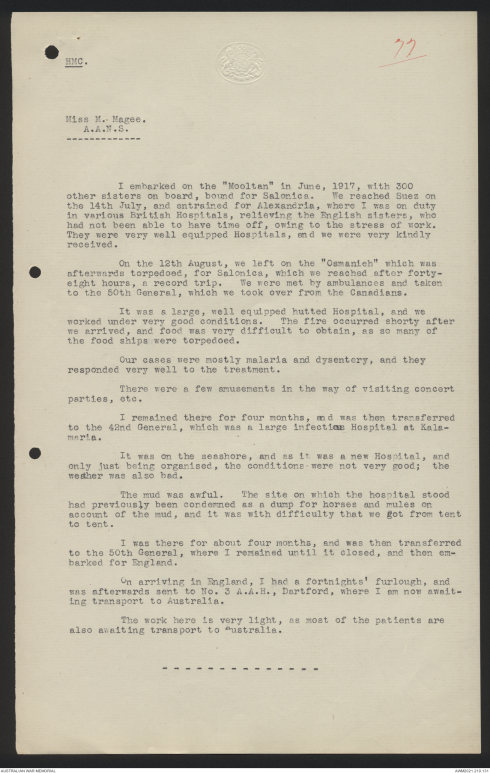
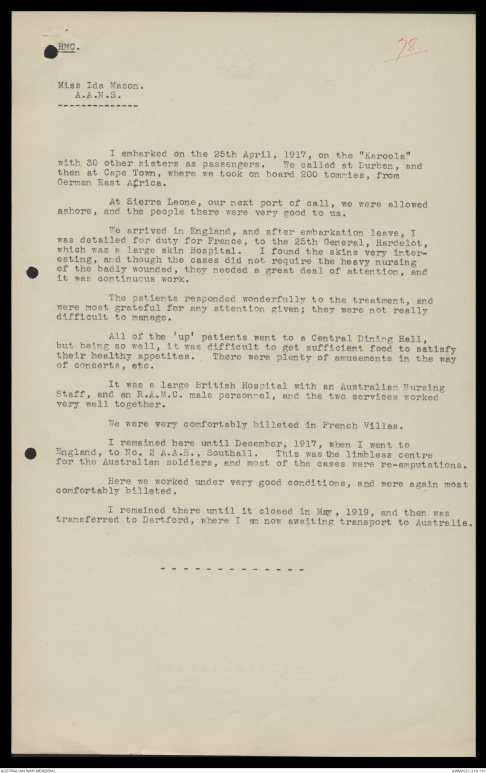
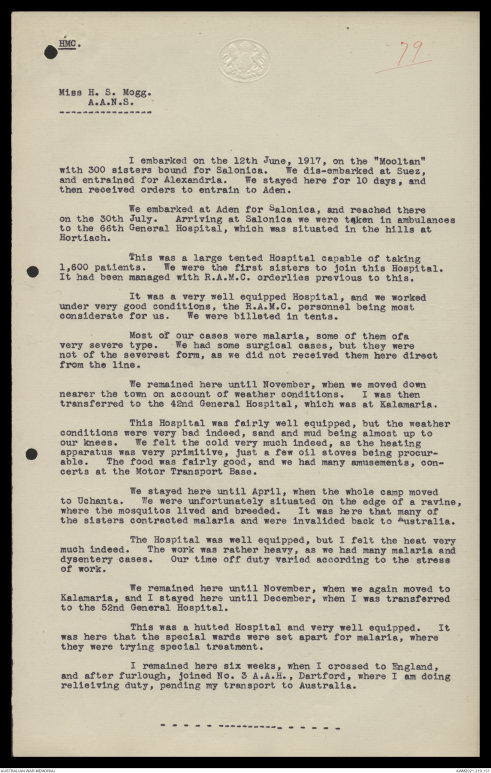
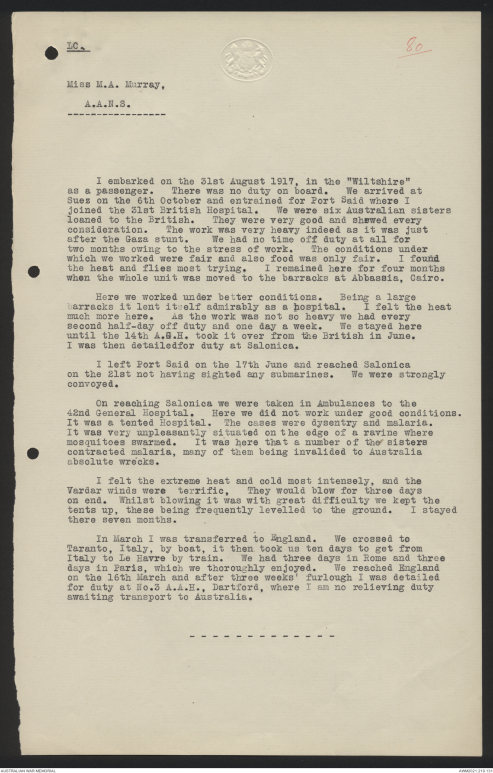
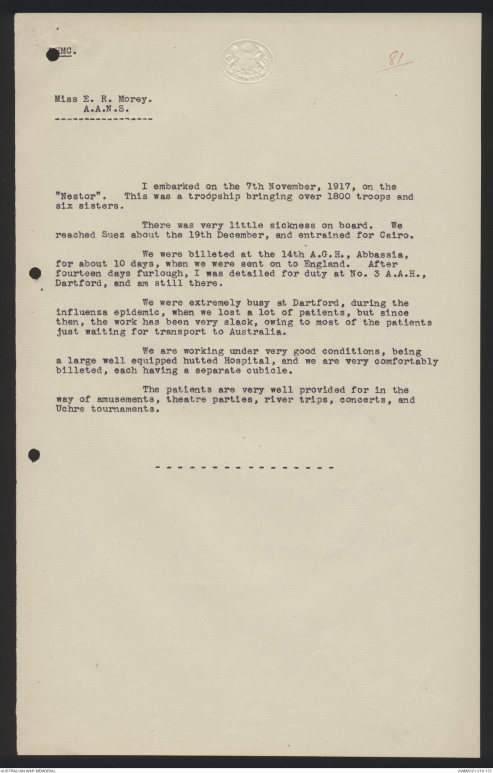
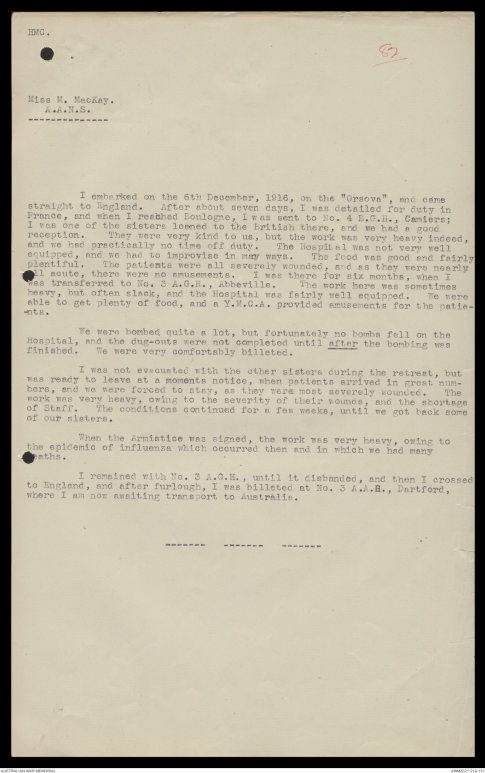
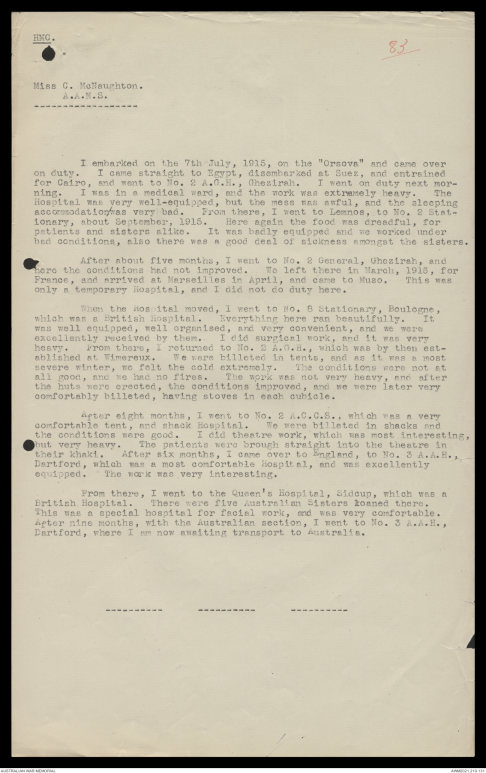
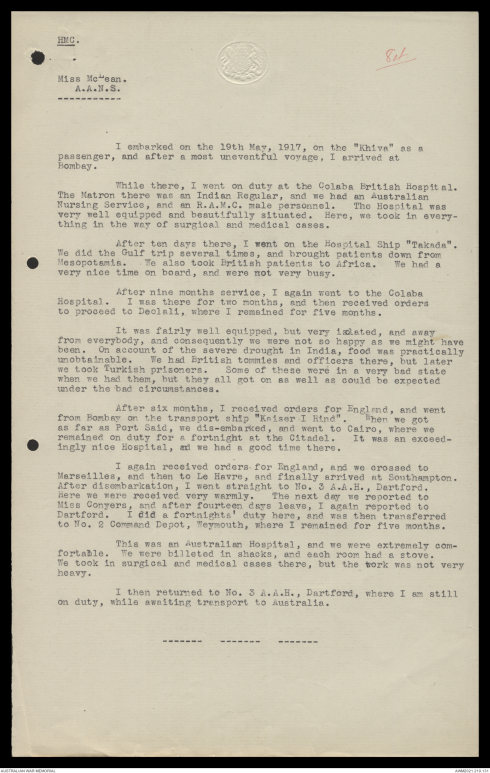
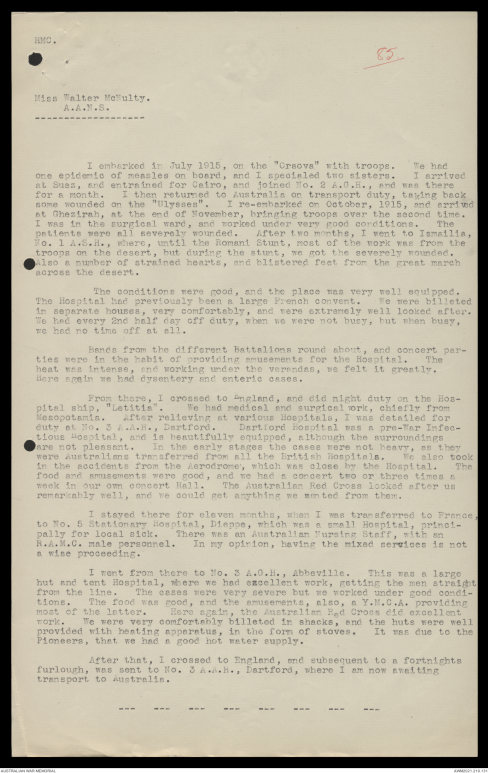
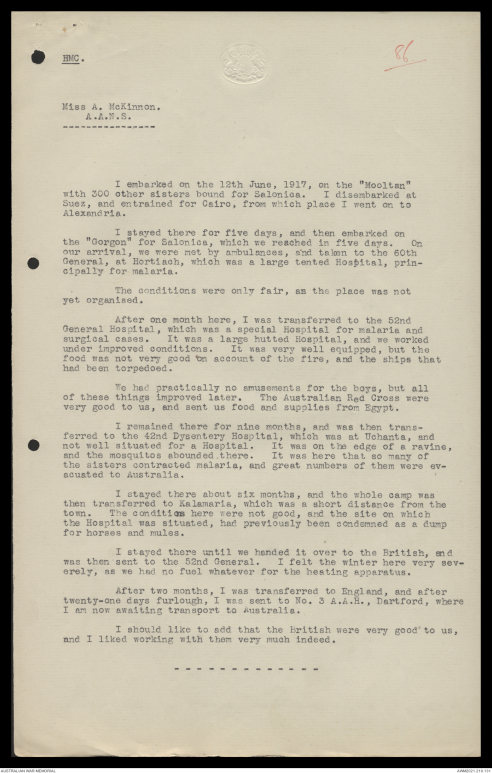
77
HMC
Miss M. Magee.
A.A.N.S.
--------------------
I embarked on the "Mooltan" in June, 1917, with 300
other sisters on board, bound for Salonica. We reached Suez on
the 14th July, and entrained for Alexandria, where I was on duty
in various British Hospitals, relieving the English sisters, who
had not been able to have time off, owing to the stress of work.
They were very well equipped Hospitals, and we were very kindly
received.
On the 12th August, we left on the "Osmanich" which was
afterwards torpedoed, for Salonica, which we reached after
forty-eight hours, a record trip. We were met by ambulances and taken
to the 50th General, which we took over from the Canadians.
It was a large, well equipped hutted Hospital, and we
worked under very good conditions. The fire occurred shortly after
we arrived, and food was very difficult to obtain, as so many of
the food ships were torpedoed.
Our cases were mostly malaria and dysentery, and they
responded very well to the treatment.
There were a few amusements in the way of visiting concert
parties, etc.
I remained there for four months, and was then transferred
to the 42nd General, which was a large infection Hospital at
Kalamaria.
It was on the seashore, and as it was a new Hospital, and
only just being organised, the conditions were not very good; the
weather was also bad.
The mud was awful. The site on which the hospital stood
had previously been condemned as a dump for horses and mules on
account of the mud, and it was with difficulty that we got from tent
to tent.
I was there for about four months, and was then transferred
to the 50th General, where I remained until it closed, and then
embarked for England.
On arriving in England, I had a fortnights' furlough, and
was afterwards sent to No. 3 A.A.H., Dartford, where I am now
awaiting transport to Australia.
The work here is very light, as most of the patients are
also awaiting transport to Australia.
--------------------------------------------------------------
78
HMC
Miss Ida Mason.
A.A.N.S.
--------------------
I embarked on the 25th April, 1917, on the "Karoola"
with 30 other sisters as passengers. We called at Durban, and
then at Cape Town, where we took on board 200 tommies, from
German East Africa.
At Sierra Leone, our next port of call, we were allowed
ashore, and the people there were very good to us.
We arrived in England, and after embarkation leave, I
was detailed for duty for France, to the 25th General, Hardelot,
which was a large skin Hospital. I found the skins very interesting,
and though the cases did not require heavy nursing
of the badly wounded, they needed a great deal of attention, and
it was continuous work.
The patients responded wonderfully to the treatment, and
were most grateful for any attention given; they were not really
difficult to manage.
All of the 'up' patients went to a Central Dining Hall,
but being so well. it was difficult to get sufficient food to satisfy
their healthy appetites. There were plenty of amusements in the way
of concerts, etc.
It was a large British Hospital with an Australian Nursing
Staff, and an R.A.M.C. male personnel, and the two services worked
very well together.
We were very comfortably billeted in French Villas.
I remained here until December, 1917, when I went to
England, to No. 2 A.A.H., Southall. This was the limbless centre
for the Australian soldiers, and most of the cases were re-amputations.
Here we worked under very good conditions, and were again most
comfortably billeted.
I remained there until it closed in May, 1919, and then was
transferred to Dartford, where I am now awaiting transport to Australia.
-------------------------------------------------------------
79
HMC
Miss H. S. Mogg.
A.A.N.S.
------------------
I embarked on the 12th June, 1917, on the "Mooltan"
with 300 sisters bound for Salonica. We dis-embarked at Suez,
and entrained for Alexandria. We stayed here for 10 days, and
then received orders to entrain to Aden.
We embarked at Aden for Salonica, and reached there
on the 30th July. Arriving at Salonica we were taken in ambulances
to the 66th General Hospital, which was situated in the hills at
Hortiach.
This was a large tented Hospital capable of taking
1,600 patients. We were the first sisters to join this Hospital.
It had been managed with R.A.M.C. orderlies previous to this.
It was a very well equipped Hospital, and we worked
under very good conditions, the R.A.M.C. personnel being most
considerate for us. We were billeted in tents.
Most of our cases were malaria, some of them of a
very severe type. we had some surgical cases, but they were
not of the severest form, as we did not received them here direct
from the line.
We remained here until November, when we moved down
nearer the town on account of weather conditions. I was then
transferred to the 42nd General Hospital, which was at Kalamaria.
This Hospital was fairly well equipped, but the weather
conditions were very bad indeed, sand and mud being almost up to
our knees. We felt the cold very much indeed, as the heating
apparatus was very primitive, just a few oil stoves being procurable.
The food was fairly good, and we had many amusements, concerts
at the Motor Transport Base.
We stayed here until April, when the whole camp moved
to Uchanta. We were unfortunately situated on the edge of a ravine,
where the mosquitos lived and breeded. It was that many of
the sisters contracted malaria and were invalided back to Australia.
The Hospital was well equipped, but I felt the heat very
much indeed. The work was rather heavy, as we had many malaria and
dysentery cases. Our time off duty varied according to the stress
of work.
We remained here until November, when we again moved to
Kalamaria, and I stayed here until December, when I was transferred
to the 52nd General Hospital.
This was a hutted Hospital, and very well equipped. It
was here that the special wards were for malaria, where
they were trying special treatment.
I remained here six weeks, when i crossed to England,
and after furlough, joined No. 3 A.A.H., Dartford, where I am doing
relieving duty my transport to Australia.
----------------------------------------------------------------
80
LC
Miss M.A. Murray,
A.A.N.S.
-----------------------
I embarked on the 31st August 1917, in the "Wiltshire"
as a passenger. There was no duty on board. We arrived at
Suez on the 6th October and entrained for Port Said where I
joined the 31st British Hospital. We were six Australian sisters
loaned to the British. They were very good and showed every
consideration. The work was very heavy indeed as it was just
after the Gaza stunt. We had no time off duty at all for
two months owing to the stress of work. The conditions under
which we worked were fair and also food was only fair. I found
the heat and flies most trying. I remained here for four months
when the whole unit was moved to the barracks at Abbassia, Cairo.
Here we worked under better conditions. Being a large
Barracks it lent itself admirably as a hospital. I felt the heat
much more here. As the work was not so heavy we had every
second half-day off duty and one day a week. We stayed here
until the 14th A.G.H. took it over from the British in June.
I was the detailed for duty at Salonica.
I left Port Said on the 17th June and reached Salonica
on the 21st not having sighted any submarines. We were strongly
convoyed.
On reaching Salonica we were taken in Ambulances to the
42nd General Hosptial. Here we did not work under good conditions.
It was a tented Hospital. The cases were dysentery and malaria.
It was very unpleasantly situated on the edge of a ravine where
mosquitoes swarmed. It was here that a number of the sisters
contracted malaria, many of them being invalided to Australia
absolute wrecks.
I felt the extreme heat and cold most intensely, and the
Vardar winds were terrific. They would blow for three days
on end. Whilst blowing it was with great difficulty we kept the
tents up, these being frequently levelled to the ground. I stayed
there seven months.
In March I was transferred to England. We crossed to
Taranto, Italy, by boat, it then took us ten days to get from
Italy to Le Havre by train. We had three days in Rome and three
days in Paris, which we thoroughly enjoyed. We reached England
on the 16th March and after three weeks furlough I was detailed
for duty at No. 3 A.A.H., Dartford, where I am no relieving duty
awaiting transport to Australia.
--------------------------------------------------------
81
HMC
Miss E. R. Morey.
A.A.N.S.
------------------
I embarked on the 7th November, 1917, on the
"Nestor". This was a troopship bringing over 1800 troops and
six sisters.
There was very little sickness on board. We
reached Suez about the 19th December, and entrained for Cairo.
We were billeted at the 14th A.G.H., Abassia,
for about 10 days, when we were sent on to England. After
fourteen days furlough, I was detailed for duty at No. 3 A,A,H,,
Dartford, and am still there.
We were extremely busy at Dartford, during the
influenza epidemic, when we lost a lot of patients, but since
then, the work has been very slack, owing to most of the patients
just waiting for transport to Australia.
We are working under very good conditions, being
a large well equipped hutted Hospital, and we are very comfortably
billeted, each having a separate cubicle.
The patients are very well provided for in the
way of amusements, theatre parties, river trips, concerts, and
Uchre tournaments.
------------------------------------------------------------------------
82
HMC.
Miss M. MacKay.
A.A.N.S.
---------------------
I embarked on the 6th December, 1916, on the "Orsova", and came
straight to England. After about seven days, I was detailed for duty in
France, and when I reached Boulogne, I was sent to No. 4 B.G.H., Camiers;
I was one of the sisters loaned to the British there, and we had a good
reception. They were very kind to us, but the work was very heavy indeed,
and we had practically no time off duty. The Hospital was not very well
equipped, and we had to improvise in many ways. The food was good and fairly
plentiful. The patients were all severely wounded, and as they were nearly
all acute, there were no amusements. I was there for six months, when I
was transferred to No. 3 A.G.H., Abbeville. The work here was sometimes
heavy, but often slack, and the Hospital was fairly well equipped. We were
able to get plenty of food, and a Y.M.C.A. provided amusements for the
patients.
We were bombed quite a lot, but fortunately no bombs fell on the
Hospital, and the dug-outs were not completed until after the bombing was
finished. We were very comfortably billeted.
I was not evacuated with the other sisters during the retreat, but
was ready to leave at a moments notice, when patients arrived in great
numbers, and we were forced to stay, as they were most severely wounded. The
work was very heavy, owing to the severity of their wounds, and the shortage
of Staff. The conditions continued for a few weeks, until we got back some
of our sisters.
When the Armistice was signed, the work was very heavy, owing to
the epidemic of influenza which occurred then and in which we had many
deaths.
I remained with No. 3 A.G.H., until it disbanded, and then I crossed
to England, and after furlough, I was billeted at No. 3 A.A.H., Dartford,
where I am now awaiting transport to Australia.
------------------------------
83
HMC.
Miss C. McNaughton.
A.A.N.S.
-------------------
I embarked on the 7th July, 1915, on the "Orsova" and came over
on duty. I came straight to Egypt, disembarked at Suez, and entrained
for Cairo, and went to No. 2 A.G.H., Ghezirah. I went on duty next morning.
I was in a medical ward, and the work was extremely heavy. The
Hospital was very well-equipped, but the mess was awful, and the sleeping
accommodation was very bad. From there, I went to Lemnos, to No. 2 Stationary,
about September, 1915. Here again the food was dreadful, for
patients and sisters alike. It was badly equipped and we worked under
bad conditions, also there was a good deal of sickness amongst the sisters.
After about five months, I went to No. 2 General, Ghezirah, and
here the conditions had not improved. We left there in March, 1915, for
France, and arrived at Marseilles in April, and came to Muso. This was
only a temporary Hospital, and I did not do duty here.
When the Hospital moved, I went to No. 8 Stationary, Boulogne,
which was a British Hospital. Everything here ran beautifully. It
was well equipped, well organised, and very convenient, and we were
excellently received by them. I did surgical work, and it was very
heavy. From there, I returned to No. 2 A.G.H., which was by then
established at Wimereux. We were billeted in tents, and as it was a most
severe winter, we felt the cold extremely. The conditions were not at
all good, and we had no fires. The work was not very heavy, and after
the huts were erected, the conditions improved, and we were later very
comfortably billeted, having stoves in each cubicle.
After eight months, I went to No. 2 A.C.C.S., which was a very
comfortable tent, and shack Hospital. We were billeted in shacks and
the conditions were good. I did theatre work, which was most interesting,
but very heavy. the patients were brough straight into the theatre in
their khaki. After six months, I came over to England, to No. 3 A.A.H.,
Dartford, which was a most comfortable Hospital, and was excellently
equipped. The work was very interesting.
From there, I went to the Queen's Hospital, Sidcup, which was a
British Hospital. There were five Australian Sisters loaned there.
This was a special hospital for facial work, and was very comfortable.
After nine months, with the Australian section, I went to No. 3 A.A.H.,
Dartford, where I am now awaiting transport to Australia.
-----------------------------------------
84
HMC.
Miss McLean.
A.A.N.S.
---------------
I embarked on the 19th May, 1917, on the "Khiva" as a
passenger, and after a most uneventful voyage, I arrived at
Bombay.
While there, I went on duty at the Colaba British Hospital.
The Matron there was an Indian Regular, and we had an Australian
Nursing Service, and an R.A.M.C. male personnel. The Hospital was
very well equipped and beautifully situated. Here, we took in everything
in the way of surgical and medical cases.
After ten days there, I went on the Hospital Ship "Takada".
We did the Gulf trip several times, and brought patients down from
Mesopotamia. We also took British patients to Africa. We had a
very nice time on board, and were not very busy.
After nine months service, I again went to the Colaba
Hospital. I was there for two months, and then received orders
to proceed to Deolali, where I remained for five months.
It was fairly well equipped, but very isolated, and away
from everybody, and consequently we were not so happy as we might have
been. On account of the severe drought in India, food was practically
unobtainable. We had British tommies and officers there, but later
we took Turkish prisoners. Some of these were in a very bad state
when we had them, but they all got on as well as could be expected
under the bad circumstances.
After six months, I received orders for England, and went
from Bombay on the transport ship "Kaiser 1 Rind". When we got
as far as Port Said, we dis-embarked, and went to Cairo, where we
remained on duty for a fortnight at the Citadel. It was an exceedingly
nice Hospital, and we had a good time there.
I again received orders for England, and we crossed to
Marseilles, and then to Le Havre, and finally arrived at Southampton.
After disembarkation, I went straight to No. 3 A.A.H., Dartford.
Here we were received very warmly. The next day we reported to
Miss Conyers, and after fourteen days leave, I again reported to
Dartford. I did a fortnight's duty here, and was then transferred
to No. 2 Command Depot, Weymouth, where I remained for five months.
This was an Australian Hospital, and we were extremely
comfortable. We were billeted in shacks, and each room had a stove.
We took in surgical and medical cases there, but the work was not very
heavy.
I then returned to No. 3 A.A.H., Dartford, where I am still
on duty, while awaiting transport to Australia.
--------------------------------
85
HMC.
Miss Walter McNulty.
A.A.N.S.
-------------
I embarked in July 1915, on the "Orsova" with troops. We had
one epidemic of measles on board, and I specialed two sisters. I arrived
at Suez, and entrained fro Cairo, and joined No. 2 A.G.H., and was there
for a month. I then returned to Australia on transport duty, taking back
some wounded on the "Ulysses". I re-embarked on October, 1915, and arrived
at Ghezirah, at the end of November, bringing troops over the second time.
I was in the surgical ward, and worked under very good conditions. the
patients were all severely wounded. After two months, I went to Ismailai,
No. 1 A.S.H., where, until the Romani Stunt, most of t he work was from the
troops on the desert, but during the stunt, we got the severely wounded.
Also a number of strained hearts, and blistered feet from the great march
across the desert.
The conditions were good, and the place was very well equipped.
The Hospital had previously been a large French convent. We were billeted
in separate houses, very comfortably, and were extremely well looked after.
We had every 2nd half day off duty, when we were not busy, but when busy,
we had no time off at all.
Bands from the different Battalions round about, and concert parties
were in the habit of providing amusements for the Hospital. The
heat was intense, and working under the verandas, we felt it greatly.
Here again we had dysentery and enteric cases.
From there, I crossed to England, and did night duty on the Hospital
ship "Letitia". We had medical and surgical work, chiefly from
Mesopotamia. After relieving at various Hospitals, I was detailed for
duty at No. 3 A.A.H., Dartford. Dartford Hospital was a pre-War Infection
Hospital, and is beautifully equipped, although the surroundings
are not pleasant. In the early stages the cases were not heavy, as they
were Australians transferred from all the British Hospitals. We also took
in the accidents from the Aerodrome, which was close by the Hospital. The
food and amusements were good, and we had a concert two or three times a
week in our own concert Hall. The Australian Red Cross looked after us
remarkably well, and we could get anything we wanted from them.
I stayed there for eleven months, when I was transferred to France,
to No. 5 Stationary Hospital, Dieppe, which was a small Hospital, principally
for local sick. There was an Australian Nursing staff, with an
R.A.M.C. male personnel. In my opinion, having the mixed services is not
a wise proceeding.
I went from there to No. 3 A.G.H., Abbeville. This was a large
hut and tent Hospital, where we had excellent work, getting the men straight
from the line. The cases were very severe but we worked under good conditions.
The food was good, and the amusements, also, a Y.M.C.A. providing
most of the latter. Here again, the Australian Red Cross did excellent
work. We were very comfortably billeted in shacks, and the huts were well
provided with heating apparatus, in the form of stoves. It was due to the
Pioneers, that we had a good hot water supply.
After that, I crossed to England, and subsequent to a fortnight
furlough, was sent to No. 3 A.A.H., Dartford, where I am now awaiting
transport to Australia.
---------------------------------------------------------
86
HMC.
Miss A. McKinnon.
A.A.N.S.
-----------------------
I embarked on the 12th June, 1917, on the "Mooltan"
with 300 other sisters bound for Salonica. I disembarked at
Suez, and entrained for Cairo, from which place I went on to
Alexandria.
I stayed there for five days, and then embarked on
the "Gorgon" for Salonica, which we reached in five days. On
our arrival, we were met by ambulances, and taken to the 60th
General, at Hortiach, which was a large tented Hospital,
principally for malaria.
The conditions were only fair, as the place was not
yet organised.
After one month here, I was transferred to 52nd
General Hospital, which was a special Hospital for malaria and
surgical cases. It was a large hutted Hosptial, and we worked
under improved conditions. It was very well equipped, but the
food was not very good on account of the fire, and the ships that
had been torpedoed.
We had practically no amusements for the boys, but all
of these things improved later. The Australian Red Cross were
very good to us, and sent us food and supplies from Egypt.
I remained there for nine months, and was then transferred
to the 42nd Dysentery Hospital, which was at Uchanta, and
not well situated for a Hospital. It was on the edge of a ravine,
and the mosquitos abounded there. It was here that so many of
the sisters contracted malaria, and great number s of them were
evacuated to Australia.
I stayed there about six months, and the whole camp was
then transferred to Kalamaria, which was a short distance from the
town. The conditions here were not good, and the site on which
the Hospital was situated, had previously been condemned as a dump
for horses and mules.
I stayed there until we handed it over to the British, and
was then sent to the 52nd General. I felt the winter here very
severely, as we had no fuel whatever for the heating apparatus.
After two months, I was transferred to England, and after
twenty-one days furlough, I was sent to No. 3 A.A.H., Dartford, where
I am now awaiting transport to Australia.
I should like to add that the British were very good to us,
and I liked working with them very much indeed.
------------------------------------------------------
 Sam scott
Sam scottThis transcription item is now locked to you for editing. To release the lock either Save your changes or Cancel.
This lock will be automatically released after 60 minutes of inactivity.